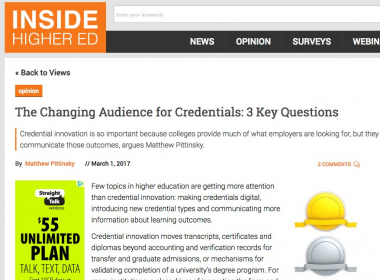A recent column appearing in the higher education news outlet points to the usefulness of the transcript to employers.
A recent column appearing in Inside Higher Ed about innovation in college credentials pointed to the success Elon has seen with its visual experiential transcript.

The column “The Changing Audience for Credentials: 3 Key Questions” by Matthew Pittinsky, an assistant research professor at Arizona State University and CEO of Parchment Inc., a digital transcript company, focuses on the attention many institutions are now being paid to “credential innovaiton.”
Pittinsky challenges the belief that colleges and universities are not providing new graduates with what employers are looking for in the work force. He says the challenge is that the traditional transcript just isn’t conveying how well a school is preparing a student in a broader sense. “The problem instead is that they (colleges and universities) just don’t assess, document and communicate those outcomes,” Pittinsky writes. “So the information is lost, and students are left to their own devices to effectively represent their collegiate experience. And the impact of colleges and universities is left implicit, not explicit.”
Pittinsky uses Elon’s visual experiential transcript as a good example of how to offer a broader look at a student’s college experience, and the impact it can have on employers.
“Although the experiences were not documented originally with employers in mind (they reflect Elon’s distinctive educational philosophy), the university recently began surveying employers who received their new experiential transcript about what was useful and what was not,” Pittinsky writes about Elon. “They found that 75 percent of employers agreed that the experiential transcript provided useful information for the hiring process, while 44 percent agreed that the experiential transcript increased the chances that an applicant would get an interview.”
Pittinsky was referencing research by a team in Elon’s Office of the University Registrar that was recently published in an article in the National Association of Colleges and Employers Journal. The article, which has received widespread attention, included the results of a survey of employers about the usefulness of the information provided in Elon’s visual experiential transcript.


